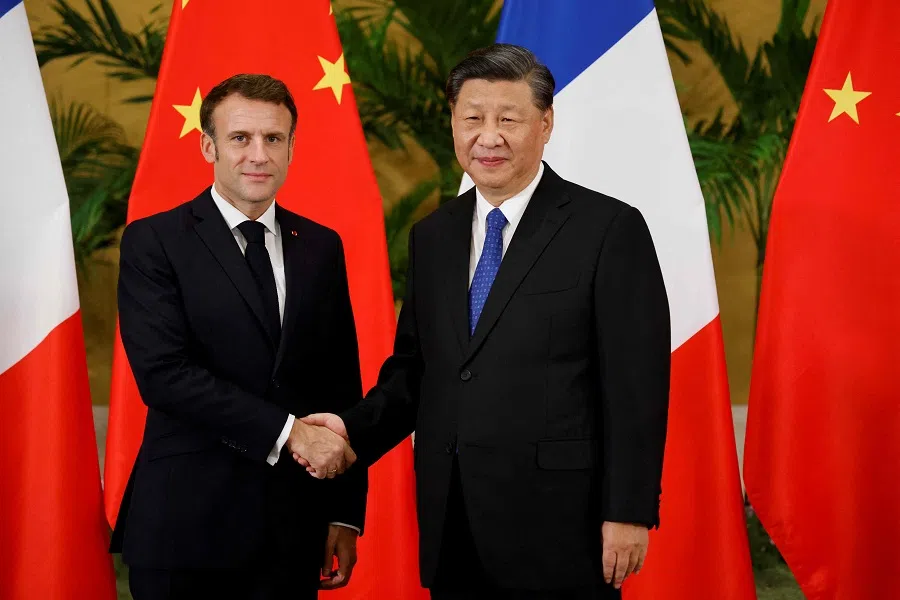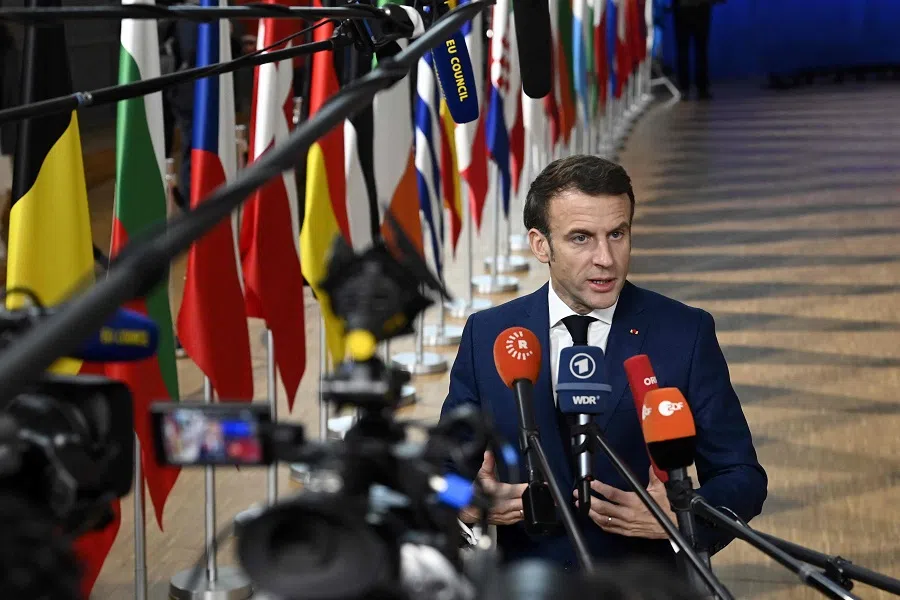Not too far, not too close: The French way of handling China
French academic Philippe Le Corre notes that France and China's fairly close relationship seems to have eroded in recent years, mainly due to market access issues and the gaping trade deficit. While President Macron's visit in 2023 could change the situation, France currently has no clear advantage over other powers in dealing with China.

As one of the European Union (EU)'s two powerhouses with Germany, France has remained a relatively strong economic and political player in an increasingly competitive world. For the past 50 years, large French companies have performed well in international markets and the country has a remarkable number of large corporations with assets spread around the world. This includes the Indo-Pacific region where the country enjoys one of the largest maritime domains and a French population of 1.6 million through its overseas territories in the Pacific and the Indian Ocean.
With regard to China, France has been trying to strike a balance. On one hand, it has pushed for a strong EU strategy over China, describing the latter as a "partner for cooperation and negotiation, an economic competitor and a systemic rival"; on the other hand, it tries to maintain a personal link with Beijing despite Germany's obvious economic advantage, stigmatised by Chancellor Olaf Scholz's brief solo visit to the Chinese capital in November 2022.
Today, France has no clear advantage over other powers in dealing with China, and there has been much disillusionment on the French business side.
France-China relations not as rosy as before
Is there a specific French way of handling China? While Beijing often presents the bilateral relationship as unique due to the early recognition of the PRC by President de Gaulle in 1964 (Beijing will indeed be keen to celebrate the 60th anniversary in 2024) and the "global partnership" established under the late president Jacques Chirac in 1997, the fairly close relationship seems to have eroded in recent years.
Today, France has no clear advantage over other powers in dealing with China, and there has been much disillusionment on the French business side. The years 2019-2020 showed a turning point when President Emmanuel Macron openly stated that "the time of European naivety" was over when it came to relations with China. When the European Council launched its "triptych" concept in Spring 2019, Paris was in full support, alongside Berlin and Brussels.

Among the issues characterising the tension, the insufficient opening of the Chinese domestic markets has been a regular complaint from the French side. France's market share in China stands at 1.5%, behind Germany's (4.5%). In food and agricultural products, France is China's eighth supplier while the US managed to increase their market share from 9% in 2019 to 16.1% in 2021. The main problem has been the increasing imports of Chinese products to France reaching 63.7 billion euros in 2021 (+ 12.8%) including electronics, computers, smartphones and ships.
Due to Covid restrictions over the past two years, many China-based expats have returned to France, while some companies have reduced their outreach following years of massive investments.
The two years following the start of the pandemic have been tense, with the Chinese ambassador to Paris in 2020 openly criticising French retirement homes for their handling of the pandemic, and France becoming more critical of China's unilateral economic practices and human rights record. In 2021, China imposed trade sanctions against Lithuania - which led to a strong unified EU reaction and Brussels filing a complaint against China with the World Trade Organization in Geneva, calling Chinese actions against the Baltic state "illegal and discriminatory".
... while the deficit with China reached a record 39.6 billion euros in 2021 (up from 38.9 billion euros in 2020 and 32.3 billion euros the previous year).
Significant trade deficits
At the time, France was holding the rotating presidency of the European Council. In such a capacity, it took the lead in drafting the EU anti-coercion instrument (ACI) which would allow counter-sanctions by the EU against third countries putting pressure on one particular member state, or on the EU as a whole. In Brussels, EU trade officials are finalising this process to be debated by the European Parliament in 2023. These measures are to be added to other defensive instruments, such as the investment screening mechanism (operational since October 2020), the white paper on foreign subsidies in the single market (July 2020) and a set of mitigating measures on 5G (January 2020).

France's finance ministry has been resolute in supporting the domestic industry which has lost considerable weight over the past 20 years, despite governmental efforts. One reason specified for France's de-industrialisation has been unfair competition from economic players outside the EU including East Asian countries. The trade agreements with Japan, the Republic of Korea or Singapore have allowed greater transparency and more balanced bilateral relations with France, while the deficit with China reached a record 39.6 billion euros in 2021 (up from 38.9 billion euros in 2020 and 32.3 billion euros the previous year).
Of late, President Macron has insisted France does not want economic decoupling, nor does it want to choose between the US and China.
The race for self-sufficiency
Under the Macron presidency, France has also enhanced its investment in deep technology, with a plan of 2.5 billion euros announced in 2019. Through its BPI Public Investment Bank, startup companies in deep tech have been encouraged and increased by 30% in 2021 in comparison with 2020. In January 2022, Exotec, a manufacturer of warehouse robots, became the first deep tech startup to join France's exclusive club of 25 "unicorns": tech companies valued at over 1 billion euros.
The government's goal is to see ten deep tech unicorns emerge by 2025. A country of engineers and entrepreneurs, France has the capacity to expand in technology. Of late, President Macron has insisted France does not want economic decoupling, nor does it want to choose between the US and China.

The EU has been working on the European Critical Raw Materials Act to diversify the bloc's supply chains of lithium and other rare earth elements towards "trusted partners" and to make strategic reserves. Largely led by France (and by France's European commissioner, Thierry Breton), it also aims to increase its global market share of semiconductors to 20% by 2030 through the European Chips Act. The Act will provide up to 42 billion euros by 2030 in public and private sector capital behind an ambitious plan to effectively double the EU's chip production.
As for relations with China, they may improve when Macron visits Beijing in 2023, but the French government remains cautious...
Finally, both France and the EU have stated that the EU cannot become as dependent on Chinese rare earth metals as it has been on Russian fossil fuels. It is a similar situation with semiconductors where Europeans no longer want to be seen as dependent on US or Asian technologies. As for relations with China, they may improve when Macron visits Beijing in 2023, but the French government remains cautious as long as China maintains its strategic ambiguity vis a vis Vladimir Putin's actions in Ukraine and does not offer better access to its own market to French and European businesses.
Related: France's Indo-Pacific strategy in creating a multipolar global order | French cultural and academic institutions alarmed by China's influence | Securing its place in the world economic order: The EU can't afford to wait for the US | China raises its international game with 'pandemic diplomacy' in Europe | Scholz's Asia month: Preparing Germany for a non-Western-centric world | Will Europe pour more money into China?





